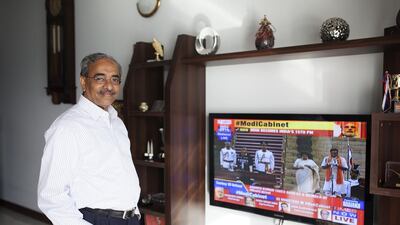DUBAI // A wish list of 21 requests from Indian expatriates in the UAE was delivered to Narendra Modi’s office on Monday as the Bharatiya Janata Party leader was sworn in as prime minister.
It included long-standing demands such as voting rights for non-resident Indians, encouraging investment in infrastructure, joint-venture incentives and exemption from restrictive taxes.
“These issues relate to NRIs all over the world, not just this region,” said K V Shamsudheen, chairman of the Pravasi Bandhu Welfare Trust, which offers free financial advice to low-income workers.
“We would like India to utilise the economic and intellectual resources and business contacts of Indians abroad for the country’s development.
“NRIs repatriate huge amounts but people generally just buy property. Even if 10 per cent was utilised properly, it would benefit the country.”
India receives more remittances from its overseas citizens than any other country. Last year expatriates sent home US$70 billion, more than Dh257bn.
Incentives to invest in the stock market and for joint venture projects and reduced taxes for money held in India would motivate investment, Mr Shamsudheen said.
Expats are also seeking long-term vision instead of surcharges in import duties and arbitrary changes in investment rules.
“When economic policies are consistent and can mature, it brings confidence and removes uncertainty,” said Mahendra Asher, who runs a chartered accountancy firm. “When the country needed it, Indians abroad invested in the Resurgent India Bond, the India Millennium Deposit, we brought a lot of money to India.”
“So encourage big foreign businesses, but also give overseas Indians incentives,” Mr Asher said.
The BJP won 282 seats in the 543-member lower house of Parliament in this month’s elections. Expatriates are optimistic the decisive mandate will ensure fulfilling election promises of curbing inflation, creating jobs, focusing on infrastructure, reducing bureaucracy and tackling corruption.
The potential of investment has roused Indians, many of whom have only ever lived in the UAE.
“This is first time in my lifetime that a government has won a landslide victory so that gives this gentleman considerable authority,” said Vishesh Manghnani, vice president of Se7en Star events and productions.
“I’m 37, I was born here and spent all my life in the UAE so this is my home. But I would definitely look at opportunities in India.”
While many appear confident that Mr Modi will revitalise the economy, there remain concerns about the party’s handling of minorities, particularly Muslims.
Mr Modi was accused of doing little to stop religious riots in Gujarat in 2002 when he was the state chief minister, although both he and his party have rejected criticism his government did not do enough to stop the violence.
“He has to prove his secularism and clear the doubts in the minds and hearts of Muslims,” said Dr Abdul Rahman, head of the India Club in Fujairah.
“People are still confused about the future because we don’t really know what will happen and we will react depending on how he deals with issues. As a Muslim, I’m concerned about how the BJP will deal with the Muslim community when in government.
“They must also look after poor people who return when they lose their jobs and don’t have a single penny; addressing all this is important.”
rtalwar@thenational.ae


